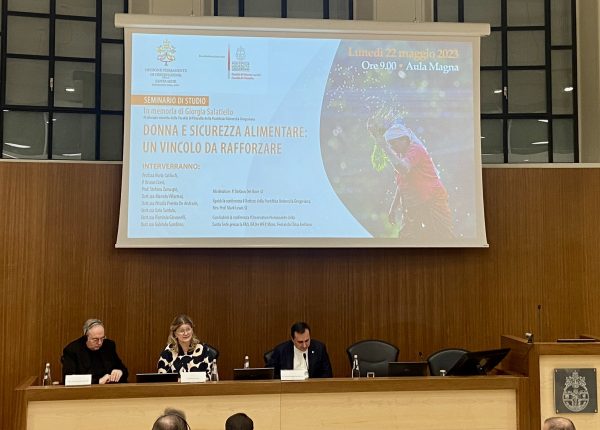Women and food security

by Alessio Valente
Font: Città Nuova
Analysis and good practices emerged on an international scale at a seminar organized by the Faculty of Social Sciences of the Pontifical Gregorian University, together with the Permanent Mission of the Holy See to FAO, IFAD and WFP, and the Rome Forum of Catholic-inspired Non-Governmental Organizations. The contribution of New Humanity and Action for a United World.
We know that the role of women in community development and the ability to ensure food security in the light of integral ecology is excellently covered.
Although it is often invisible in the eyes of many, the good accomplished by them is not only realized in every relationship but extends and generates community. This is what was expressed in the conclusions by Msgr. Fernando Chica Arellano, Permanent Observer of the Holy See to the FAO, who well summarized the theme of the study seminar “Women and Food Security: a bond to be strengthened” held on May 22 at the Aula Magna of the Pontifical Gregorian University.
The seminar dealt with this theme through several papers that were dense in content and capable of triggering profound reflections, as well as some experiences of Catholic-inspired NGOs that brought out the importance of women in promoting education, economic livelihood, and family and community development. Each report helped illuminate one aspect of the inextricable link between women and food security. It began with an illustration by Prof. Nuria Calduch, head of the Department of Biblical Theology at the university hosting the conference, of the pages of the Bible that speak of women’s dedicated and generous agricultural work, almost as if to redeem the evil they have committed and for the benefit of all men.
Instead, Prof. Stefano Zamagni, emeritus of Political Economy at the University of Bologna, extolled the role of women starting with food education, which should be carried out already in the family.
Unfortunately, the economist pointed out, this role of hers is threatened by the crisis of the family institution itself but perhaps even more so, with regard to food security, by the oligopoly of seeds. Those who manage them have no interest in making quality available or maintaining stable production; in this context, the woman is completely excluded.
This condition, or her irregular, transient, meager involvement, probably makes the fight against hunger problematic. A fact highlighted by the alarming numbers set out in the report by Dr. Marcela Villareal, director of the Division of Partnerships and Collaboration with the UN at FAO. Yet women, as Villareal points out, precisely in rural management and work, even in the case of particular events (natural disasters, pandemics, etc.) perform better than men and are more effective.
Subsequent reports by Dr. Karinki, a representative of the legal department of UNIDROIT (an auxiliary body of the United Nations), and Dr. Satu Santala, associate vice president for external relations and governance of IFAD (International Fund for Agricultural Development), confirmed the difficulties of women in ‘accessing credit not only to eradicate poverty and hunger in rural areas of developing countries but also to get back on their feet after calamitous events such as those of climate change.
All this only widens the gap between men’s work and women’s, who nevertheless find greater fulfillment in family or small community settings.
The ability of women to increase the sustainability and quality of peace processes was extolled by Dr. Flaminia Giovannelli, former undersecretary of the Dicastery for the Service of Integral Human Development. And this along with the ability to support in a totally invisible, but fundamental way, the fishing and aquaculture sector, keeping family affections and the work system strong as confirmed by Father Bruno Ciceri, former director of Stella Maris Internazionalis. Women’s balance between family and work and the need for its harmonization was the topic developed in the talk by Dr. Gabriella Gambino, undersecretary of the Dicastery for Laity, Family and Life. Gambino was able to connect, in particular, the capacity of women to generate relationships and thus make the common good accessible to all. In order to give strength to this seminar, the representative of the dicastery for the laity offered the key word to always keep in mind in every community, small or large, to develop a greater sensitivity toward care: sharing.
Finally, among the experiences offered to demonstrate what was highlighted in the reports emerged the one proposed by New Humanity and AMU, an NGO of the Focolare Movement, concerning women protagonists of community development in the rural area in Burundi (Central Africa). In particular, through a video testimony, a young woman, a caring mother of a family and tenacious worker in the agricultural sector passionately recounted her commitment in that field. The effectiveness of her action helped to create wealth for other families in need as well, simply by investing in the products of the land from processing in the fields to selling in the markets to managing credit.
“Burundi: Women as protagonists of community development in the rural area”
Speaker: Emanuela Castellano – on behalf of AMU – Azione per un Mondo Unito and CASOBU. (From New Humanity NGO ‘s network)


